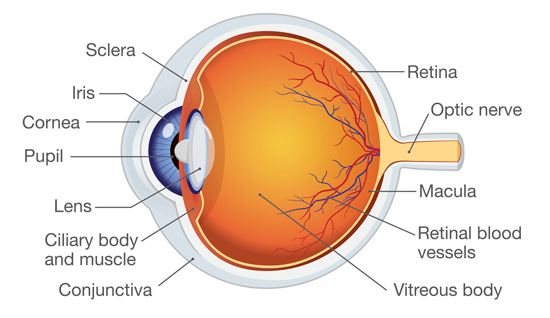Eye floaters: What causes them, and when to see a doctor

Do you sometimes notice small floating specks, shadowy shapes or blurry spots in your line of vision? If you do, eye floaters may be the culprit. You may try to blink them away, but they move with you when you look in a different direction. While they can be annoying, eye floaters often happen naturally over time and are common as we age.
What are eye floaters, and where do they come from?
To better understand eye floaters, it helps to understand basic eye anatomy. The middle of the eye is filled with a gel-like fluid called the vitreous. This is where eye floaters are located.
As we age, the natural gel-like fluid in the vitreous starts to contract, creating tiny clumps or strands. When you experience floaters, you see the shadows created by these clumps as they slowly drift through the vitreous and hover in front of the retina. The retina is located in the back of the eye and sends signals to the brain, where they become images. How they appear depends on if they are close to or further away from the retina. Head position, movement, brightness, background and fatigue can all be factors when seeing eye floaters.
Eye floaters can become less noticeable over time, but may not go away completely.
Who is more likely to develop eye floaters?
Many people have no family history of retinal detachment or tears when they start noticing eye floaters. For many, floaters may begin showing up between 50 and 70 years of age.
"Highly nearsighted patients tend have more floaters than average, but other factors such as recent trauma or uveitis, inflammation of the eye, may also lead to floaters,” says Steven Yeh, MD.
Can eye floaters signal something more serious?
While eye floaters are often a normal finding that can be associated with aging, there are circumstances when they can be a symptom of a more serious condition. Retinal detachment is a condition where contracture of the vitreous may lead to the retina separating from the back of the eye. Causing serious vision problems, posterior vitreous detachment and retinal tears can cause a sudden increase of floaters, bursts of light across your field of vision, or a loss in peripheral (side) vision. Contact your doctor right away if you experience these symptoms.
Should I let my doctor know if I'm experiencing eye floaters?
Although common as we age, let your eye doctor know if you are experiencing eye floaters. Maintaining regular eye exams is always a good idea, but especially important if you notice an increase in new floaters, flashes or significant vision changes.
If you have certain medical conditions like diabetes, high blood pressure, multiple sclerosis or cataract surgery, be diligent to notify your doctor of any vision changes or problems.
A complete evaluation may include:
- Vision exam
- Pupillary exam
- Confrontation visual fields
- Eye movement exam
- Intraocular pressure measurement
- Slit-lamp microscope exam
- Vitreous and retinal examination with pupillary dilation






